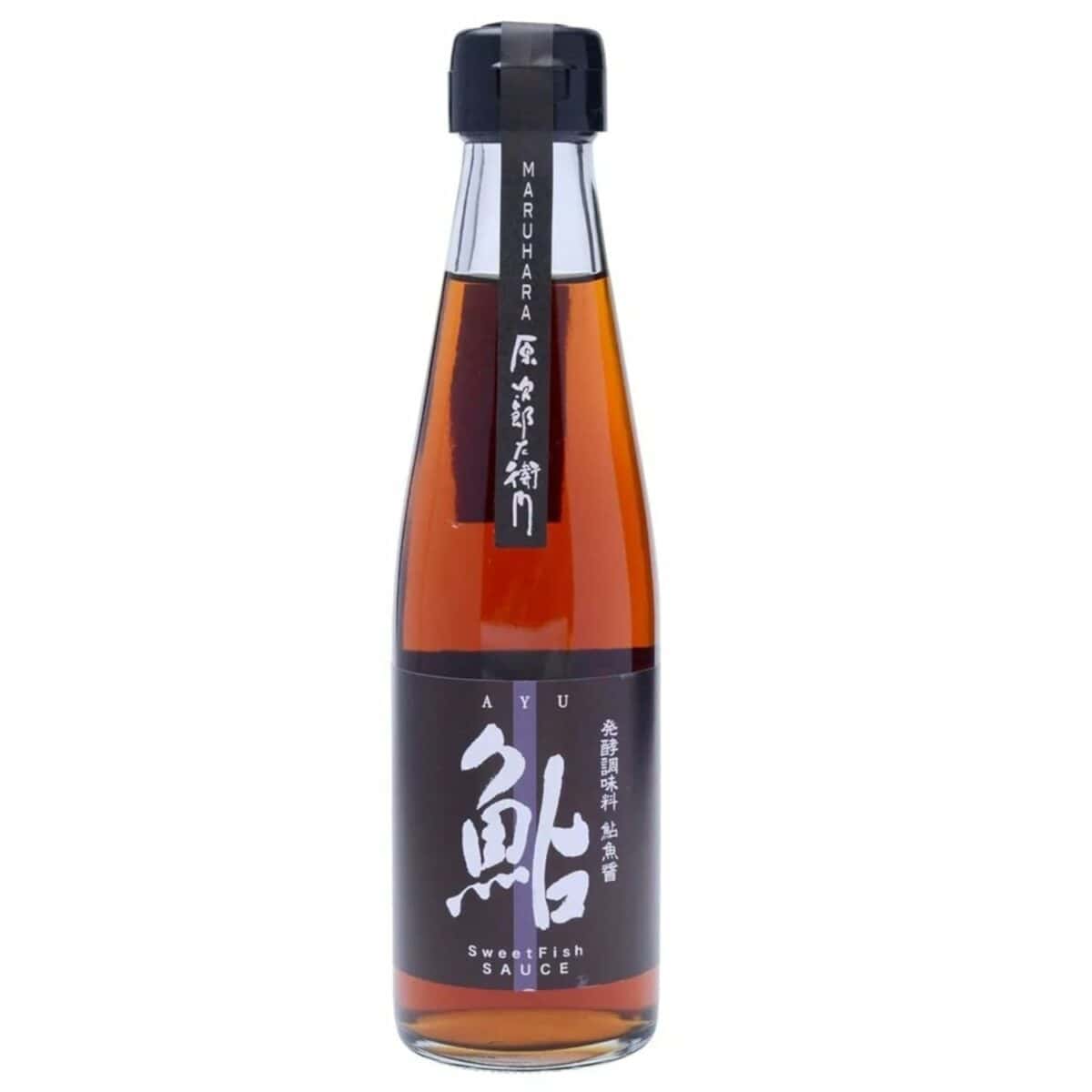Ayu Fish Sauce: Ingredients, Taste & Origin

Ayu fish sauce, or ayu gyosho is one of the most prominent Japanese fish sauces. It’s made from ayu sweet fish, a freshwater fish, making it mellow and less pungent than other Japanese fish sauces, which are usually made from saltwater species.
It has a high salt content, so it should be eaten in moderation, and you can get it from international retailers and importers like Asahi Imports. It should be used sparingly, but can replace soy sauce or salt in noodle dishes or hotpots.
Although it has been developed relatively recently, it enjoyed rapid success due to its refined taste and thoughtful marketing by developer and manufacturer Maruhara.
The small ayu sweet fish is caught along the coast of Hokkaido, often an incidental catch for the fisherman of the region.

Check out our new cookbook
Bitemybun's family recipes with complete meal planner and recipe guide.
Try it out for free with Kindle Unlimited:
Read for freeIn this post we'll cover:
What are the ingredients of ayu sauce?
There are only two ingredients in ayu sauce: the freshwater fish “Ayu sweet fish” and table salt.
The sauce is made by fermenting the fish with the salt for around six months. When the fermentation period is complete, the mixture is pressed to extract all the flavorful juices. The juice is then filtered and aged for four months in order to mellow and soften the aroma.
It is mellow but should be used in moderation. You can get it online to use it with sushi, noodles, or hotpots.
What does ayu sauce taste like?
Like all Japanese fish sauces, ayu fish sauce tastes primarily salty, with deep umami flavor. It is not designed to be consumed by itself, but to be added as a seasoning to other dishes as a natural flavor enhancer.
It is extremely mellow and less pungent than other fish sauces you may have tried, even when compared with other Japanese fish sauces.
Is ayu sauce healthy?
Any food with high salt content, like ayu fish sauce, is recommended to be consumed sparingly.
However, ayu sauce is only used in very small quantities, and usually to replace salt, rather than add to it. Additionally, the added umami flavor of the sauce often means that the same savoriness can be achieved with less overall salt content, making it a healthier alternative to salt alone.
Therefore, when used correctly, there is no need to avoid ayu fish sauce in your diet, unless you have been advised to very strictly limit salt intake.
Where can I get ayu fish sauce?
You can get ayu fish sauce online from Amazon. It is shipped internationally as well as within the Japanese territories.

Additionally, Asahi Imports in the USA also offers ayu fish sauce to order online, or to pick up from their store in Austin, Texas.
If you live in Japan, ayu fish sauce is available from many specialist stores, especially those in its native region of Hita in Oita Prefecture, as well as directly from the manufacturer Marahara at one of their stores in Mameda, Fukuoka and Kitakyushi.
What do you cook with ayu fish sauce?
The easiest use for ayu fish sauce is simply to replace soy sauce with ayu sauce when eating sushi or sashimi.
As with soy sauce, you should use it very sparingly, just adding a single drop to enhance flavor. The deep umami notes of the ayu fish sauce will elevate the taste of the sushi, adding savor and depth, without tasting at all “fishy”.
Ayu fish sauce can also be used in noodle dishes or hotpots to balance flavors. Maruhara themselves, in their “The Secret Ingredient To Three-Star Restaurants” PDF guide, suggest adding it at the end of the cooking process, to create a well-balanced, delicious dish.
Japanese-Italian chef Fabio has partnered with Maruhara to develop the fusion dish “Butter pasta with ayu fish sauce”, which can be seen on his Youtube recipe channel “Fabio Rice”.
Naoko Takei Moore of Toiro Japanese store suggests using ayu sauce in donabe “one-pot” dishes, including Nao Man Gai, Basil Chicken and Clam Rice, among others.
What is the origin of ayu fish sauce?
The origin of ayu fish sauce comes from the irregular nature of the fish harvest. Local fish farmers wished to find a way to make use of the ayu sweet fish in their catch, that was not dependent on guaranteeing a minimum daily, or weekly quota.
The fishermen consulted with Masayuki Hara, president of the local soy sauce brewery Maruhara in the city of Hita, Oita Prefecture. Together, they developed ayu fish sauce. It took four years of trial and error to perfect the process.
What is the history of Maruhara soy brewery?
Maruhara was founded as a company in 1899, to produce miso and soy sauce.
However, its origins go back still further, with the company’s ancestors using the rich, pure stream of the Chikgo River to create and refine their brewed products, from the Heian period 800 years ago.
Maruhara’s philosophy is to adapt to change, without losing the traditions that have brought them thus far.
Today, as well as miso and soy sauce, Maruhara soy brewery is also the sole manufacturer of ayu fish sauce as well as other delicious seasonings and condiments, including a special soy sauce that is based on the ayu fish sauce flavor.
Is ayu fish sauce ethically produced and environmentally friendly?
Yes, ayu sauce is considered an environmentally friendly product. Because it is produced from a byproduct of the fishing industry, that would otherwise have been wastefully discarded, it makes use of the “whole catch” philosophy.
Additionally, like all Japanese fish sauces, it is considered a “slow food”, under the definition of the movement which promotes local small businesses, traditional production and sustainable use of livestock from the local ecosystem.
What is ayu sweet fish?
Ayu sweet fish is a small freshwater fish found along the coast of Hokkaido. Its name comes from its distinctive sweet flavor.
The fish is caught irregularly, and unpredictably, rather than being abundant at any given season or micro region. It has historically been considered an incidental catch when fish farmers in the Hokkaido region swept up ayu sweet fish along with other, more sought-after species.
How does ayu fish sauce compare to other Japanese fish sauces?
Ayu fish sauce is typically considered milder and more mellow compared to other Japanese fish sauces.
Freshwater fish have a milder taste than saltwater ones, and ayu sweet fish are especially delicate. Use of this fish to manufacture the sauce, along with the careful aging process, means that pungency and unpleasant fishy aromas are virtually eliminated, to create an exceptionally mild and mellow flavor with a deep amber color.
Check out our new cookbook
Bitemybun's family recipes with complete meal planner and recipe guide.
Try it out for free with Kindle Unlimited:
Read for freeCaroline first opened the doors to her own apartment in Berlin to guests, which was soon sold out. She then became the head chef of Muse Berlin, Prenzlauer Berg, for eight years, renowned for “international comfort food.”

